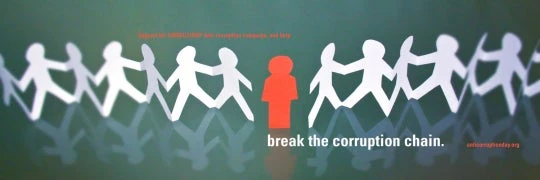
On International Anti-corruption Day 2014, one of the issues we at the Stolen Asset Recovery Initiative want to illustrate - is how recovering stolen assets helps fight corruption and end impunity.
On International Anti-Corruption Day, those involved in this effort, gather to express a shared commitment to take action, and to pledge - in the words of this year’s Twitter hashtag – to #breakthechain, against all forms of corruption - from petty bribes to grand corruption.
Here at the World Bank, we are hosting the ‘International Corruption Hunters Alliance’. The Duke of Cambridge, Prince William, spoke out strongly, highlighting the malignant effects of corruption as, ‘an abuse of power; the pursuit of money or influence at the expense of society as a whole’.
At the same time, World Bank Group President Jim Yong Kim called on the corruption hunters to, 'freeze, forfeit and recover stolen assets so that the flow of corrupted funds is disrupted.’
We will only succeed in our collective efforts against corruption if we also go after those who make it possible - the enablers and facilitators - in the form of the lawyers, accountants and financial institutions. Corrupt officials need these professional money-launderers to stash their ill-gotten gains. They are a vital link in the chain that must be broken to effectively combat corruption.
So, where do we stand with asset recovery, and are we really making a difference?
A recent paper by the Stolen Asset Recovery Initiative (StAR) and the OECD, ‘Few and Far: the Hard Facts on Asset Recovery’, laid out the hard facts. From 2006-2012, US$2.623 billion of allegedly stolen assets were frozen, with US$423.5 million returned. The publication also showed that three countries (the US, UK and Switzerland) were responsible for the overwhelming majority of the assets frozen and returned.
This represents a considerable achievement and a dramatic increase compared to earlier periods. However, when considering that at least US$20 billion is stolen each year, the amounts frozen and returned seem still very modest. These facts also highlight how much more remains to be done.
Critically, three things are needed: political will, capacity building, and international cooperation.
“Few and Far”, along with a number of recent cases shows that asset recovery can and does work. It requires tenacity and creativity – but it pays.
For example, earlier this year, the Government of Liechtenstein returned US$225 million to Nigeria, following fourteen years of legal maneuvering. This is a long time, but by investing such efforts it dispatched a powerful message to the criminal and corrupt.
Additionally, just last month, the US Department of Justice reached a settlement with Teodorin Obiang, the son of the President of Equatorial Guinea, who was accused of ‘relentless embezzlement and extortion’. Mr. Obiang settled to sell property and pay over US$30 million, most of which will be used by a charitable organization working to help the people in Equatorial Guinea.
In these instances along with others, our primary goal- at StAR - is to provide the tools and support to countries seeking to recover stolen assets. We work with developing countries along with financial centers to tackle safe havens for ill-gotten money, and return stolen assets.
StAR has helped countries achieve some notable successes. For example, following the fall of President Zine el Abidine Ben Ali of Tunisia, US$29 million was recovered from a Lebanese bank account belonging to the former President’s wife. In addition a plane, yachts, and other physical assets were also returned to Tunisia.
These actual returns are important – not least because they provide much needed resources to finance development. But asset recovery is also about sending a strong message that bad deeds will not pay, and that there will be no impunity.
We need to be aware of the obstacles, frustrations and delays that have stood in the path of these achievements. But they demonstrate also why political will, capacity building and international cooperation matter. No matter how long it takes, asset recovery is achievable.
This year, International Day of Corruption is about ‘#breakingthechain’. Freezing, confiscating and returning ill-gotten gains is a critical step to this end, ultimately bringing to people what is rightfully theirs.


Join the Conversation